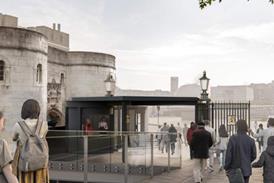- Home
- Intelligence for Architects
- Subscribe
- Jobs
- Events

2025 events calendar Explore now 
Keep up to date
Find out more
- Programmes
- CPD
- More from navigation items
What is Oxford Street for?

Footfall is still down, so some radical new thinking is needed to save one of the UK’s most iconic streets, writes Martyn Evans
We have been questioning the role of traditional bricks and mortar in relation to the rise in Internet shopping for some time, but it hasn’t felt like an existential debate. Now, I’m not so sure. Last week, a British Retail Consortium footfall survey confirmed visitor numbers to the UK’s high streets, shopping centres and retail parks are staying stubbornly 12.5% down on pre-pandemic levels. Is it time we started to think bigger?
Of course, Oxford Street is so much more than the shopping. With Mayfair and Soho to the south and Marylebone and NoHo to the north, it’s also an upscale residential and commercial office powerhouse. But if we acknowledge that those sectors in our industry are the ones facing the biggest challenges, Oxford Street and its immediate surroundings feels like it’s in the eye of the storm.
…
This content is available to registered users | Already registered?Login here
You are not currently logged in.
To continue reading this story, sign up for free guest access
Existing Subscriber? LOGIN
REGISTER for free access on selected stories and sign up for email alerts. You get:
- Up to the minute architecture news from around the UK
- Breaking, daily and weekly e-newsletters
Subscribe to Building Design and you will benefit from:

- Unlimited news
- Reviews of the latest buildings from all corners of the world
- Technical studies
- Full access to all our online archives
- PLUS you will receive a digital copy of WA100 worth over £45
Subscribe now for unlimited access.






